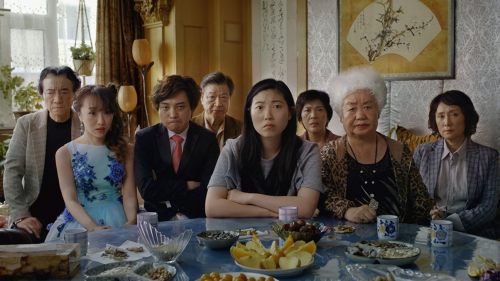Sundance Review: THE FAREWELL - Good Luck Disliking This One
By now it’s likely you’ve heard some good things about Lulu Wang’s The Farewell, probably the most buzzed about film from this year’s Sundance. People aren't chatting about the film because it’s this amazing work of independent cinema but rather because it’s about as close to middle-of-the-road perfection as you can get.
I say that with affection as I found myself just as charmed by The Farewell as everyone else. This is a movie designed from the ground up to entertain without any potential viewership roadblocks. It’s funny, but not too funny. It’ll make you tear up, but you probably won’t need any tissues. It offers moms and dads of America a gentle look at a culture far different from theirs while telling a very human story everyone can relate to.
The Farewell focuses on Awkwafina’s Billi, a struggling youngster whose parents moved her to America when she was still in elementary school. She holds on to fond memories of China thanks to a close relationship with her grandmother. Unfortunately, news arrives that this grandmother is dying of advanced lung cancer. Her family orchestrates a wedding as an excuse for them all get back together and see her one more time before she dies. All without telling her what they’re up to or that she’s even sick. In fact, Billi isn’t invited out of fear she’ll show her concern and sorrow on her face and ruin the charade.
But she comes anyway. Awkwafina is amazing in everything, but she’s especially good here in a lead role. It’s all pretty understated drama with little beats of comedy here and there. Much of the role’s challenge is nonverbally communicating the conflict her character feels over lying to her grandmother and her desire to acquiesce to her family’s wish to keep that lie going.
As Billi’s a product of two different cultures, the movie confronts its themes through this conflict. The American side of her thinks as an individual, which means absolving herself of the lie's guilt. The Chinese side of her understands thinking as a collective and experiencing the burden of that guilt on her grandmother’s behalf.
Her parents are also basically Americans as well. And his brother’s family has moved to Japan. We see this conflict most with Awkwafina, but she is not the only one to struggle with it. And as good as Awkwafina is in the film, it only works because of the incredible supporting cast. We follow a family of about ten people. Due to sharp writing and casting, they all have identifiable personalities; by the end of the movie, it feels like we know them and feel the story weighing upon all their shoulders together.
This is why The Farewell is such a perfect family movie, one I suspect can be appreciated in any culture. It’s usually awkward to meet up with extended family members we haven’t seen in a while, but with some united goal the dynamics change a bit, which is the space The Farewell occupies. There is bickering, but it seems less negative and dramatic when it’s in service of a shared purpose.
The Farewell is an ideal feel-good movie. But that’s all it is, so watch out for the hype it’s currently enjoying. People will probably talk a lot about the film when it finally comes out. Your parents will ask if you’ve seen it. And what the heck, if you’re close by, you should probably take them out to catch it followed by a nice, warm meal. It’s not exactly common for a movie that serves this purpose to be so good. Just imagine all the 2018 Thanksgivings that ended with Bohemian Rhapsody.



